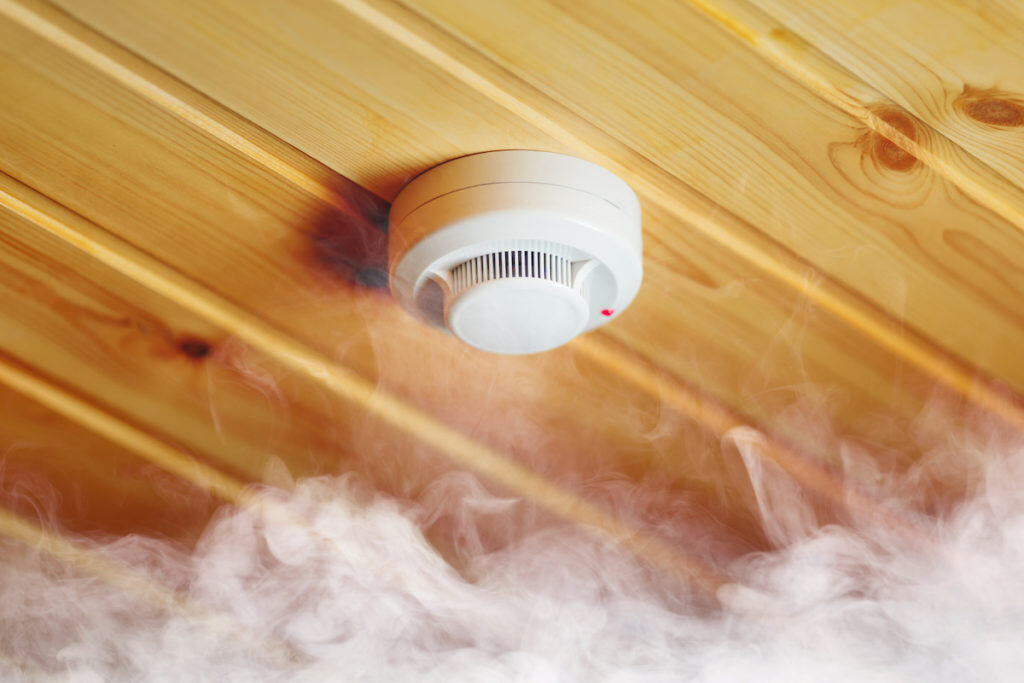Smoke alarms are an integral part of a property's safety system. They serve as the first line of defense in alerting occupants to the presence of a fire, allowing them to evacuate the premises quickly and safely. However, many people are still in the dark about how these alarms function and what it takes to keep them in working order. Additionally, some alarms have specifications that are suited to different needs. Before you set off to enhance your safety system, read on to learn about a small thing that can make a difference.
What Is a Smoke Alarm?
A smoke alarm, also known as a smoke detector, is an electronic device designed to detect the presence of smoke. Smoke alarms are typically powered by a battery and monitored by an alarm system, such as a fire panel or home security system. When smoke is detected, the alarm will emit an audible, unmistakable signal to alert occupants of the potential danger in their environment.
How Does Smoke Detector Work?
Smoke alarms sense the presence of smoke in the air. They detect the tiny smoke particles produced by fires that are too small to be seen by the naked eye.
Most smoke alarms use one of two types of sensors to detect smoke: ionization sensors and photoelectric sensors. Ionization sensors use a small amount of radioactive material to ionize the air inside the sensor chamber. When smoke enters the room, it disrupts the electrical current, triggering the alarm. Photoelectric sensors use a beam of light directed at a detector. When smoke enters the chamber, it scatters the light, triggering the alarm.

When a smoke alarm detects smoke, it activates a loud, high-pitched sound that alerts occupants of the potential danger. The notice gives people time to evacuate the property and call for help. It's important to test smoke alarms regularly to ensure they function correctly and replace the smoke detector batteries at least once a year.
What Are the Different Types of Smoke Alarms?
Working smoke alarms are your best bet in keeping you and your property safe. There are a variety of industry-standard smoke alarms on the market, each with its capabilities and features. No matter which one you choose, it can safeguard your property and life at a moment's notice. Here are some of the most popular choices:
- Ionization detectors. This kind contains a small amount of radioactive material that ionizes the air inside the detector. When smoke enters the sensor, it disrupts the ionization process, which triggers the alarm. Ionization smoke detectors are generally better at detecting fast-burning fires. An ionization smoke detector is ideal for bedrooms and hallways as it is more sensitive to fumes and smoke.
- Photoelectric detectors. Photoelectric smoke alarms use a light source and a photosensitive sensor to perceive heat. In a photoelectric smoke detector, the smoke enters and scatters the light beam, triggering the alarm. Photoelectric smoke detectors are generally better at detecting smouldering fires.
- Combination smoke detectors. These combine ionization and photoelectric detection technologies, providing better overall fire detection.
- Domestic smoke alarms. Stand-alone smoke detectors are designed for home use. They may use either ionization or photoelectric technology or a combination of both.
- Carbon monoxide alarms. These detect the presence of carbon monoxide, a toxic gas produced by malfunctioning appliances or a fire. A carbon monoxide alarm protects against carbon monoxide poisoning.
Installing a combination of these smoke detectors in a home is best for extra security and safety. Household smoke detectors ensure you and your home are protected in the event of a fire disaster.
Importance of Smoke Detectors: How They Prevent Catastrophes
Smoke detectors are an absolute necessity against fire dangers. In addition to providing an early warning system, smoke alarms can minimize fire damage by alerting residents as soon as possible, giving them time to leave the building before it is too late.
It is important to note that commercial and industrial smoke detectors issue a signal to a fire alarm control panel as part of a building's central fire alarm system.
Having a properly functioning smoke alarm is also essential for insurance purposes. Many home and business insurance policies require installing smoke alarms for coverage eligibility. Failure to have a working alarm can disqualify you from some types of coverage.
After Flaming Fires, Call PuroClean for Restoration Services
The aftermath of a fire can be overwhelming and devastating for your home or business. The fire and smoke damage can be extensive, leaving you feeling helpless. In these situations, having a trusted professional by your side is vital to restore your property and get your life back on track. That's where PuroClean comes in. As a leading provider of fire damage restoration services, we have the expertise, experience, and equipment necessary to handle even the most challenging fire damage situations.
PuroClean can help you quickly navigate the complex restoration process of fire damage, from emergency board-up services to smoke and soot removal. Don't delay getting expert help. Visit our online office locator or call (877) 261-7876 today to find your local PuroClean office.
